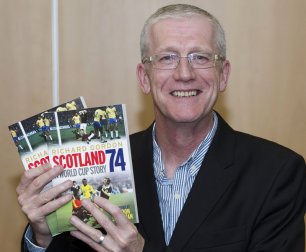It is the summer and everyone likes a book to read over the summer. Even better, it is the summer in a World Cup year and everyone likes a World Cup book to read over a World Cup summer.
Even better than that is having a World Cup book to read over a World Cup summer that is dedicated to what was Scotland’s best ever performance in the Finals.
Back in 1974 a Scottish team including some great figures of the Scottish game such as Denis Law, Jimmy Johnstone and Kenny Dalglish travelled to Germany and came home as the only undefeated side in the Tournament.
It was not enough to make a serious dent in the tournament however they came close, agonisingly close, as Richard Gordon’s Scotland 74 – A World Cup Story charts.
The well respected BBC Sportsound presenter explained why the book and why now by saying: “I was looking to do a follow up to the Gothenburg 83 book that I had written to mark the thirtieth anniversary of Aberdeen’s European Cup Winners Cup success over Real Madrid. I had great fun doing that and I wanted to follow a similar format by building a book around a significant anniversary.”
“I looked around and the fortieth anniversary of Scotland’s World Cup campaign in West Germany in 1974 jumped out. There were just so many aspects to the squad that went to that tournament as it was full of characters and talent. Of course the squad also came home undefeated.”
The tournament saw Willie Ormond’s squad up against Zaire, holders Brazil and Yugoslavia and it is a well-remembered gathering of nations.
Gordon said: “It is remarkable how many people that I have spoken to recall that World Cup fondly and part of the reason for that is that for a large number of people in the country it was the first World Cup in colour. Unfortunately for me, I was one of those still watching it on a black and white set as I had done the 1970 one with my dad up in Aberdeen but colour TV’s were becoming the norm.”
Monochrome did not mean less enjoyment with Gordon adding: “I have vague recollection of Mexico 1970 with the great Brazilian team and England playing West Germany. I can also recall that even in black and white the semi-final between Italy and West Germany was a great game as was the final between Brazil and Italy.”
The scale of this summer’s competition is literally twice as big as 4 decades ago with Gordon explaining: “The World Cup in 1974 was a different style of competition as Scotland was one of only 16 teams competing and our country caught a bout of World Cup fever. There were things like beer cans and beer mats made to commemorate the Finals but Scotland were not going there for a party.”
“Looking back through the records you can see that opposition managers faced Scotland and both the Scottish manager Willie Ormond and players talked about winning the World cup. It was different from the razzamatazz that went along with Ally MacLeod saying it in 1978 but there was a belief that Scotland would do well.”

trainer Ronnie McKenzie (June 1974)
That belief was not unfounded as the 22 strong squad had players from a Leeds side that were very strong in England, players from Rangers who had won a European trophy just 2 years before and emerging talent like Kenny Dalglish alongside a Lisbon Lion in Jimmy Johnstone from Celtic.
Despite the much smaller number of countries competing getting to the Final was a lot easier than nowadays with Gordon explaining: “Getting there was different as Scotland only had to play 4 games to qualify. The current manager Gordon Strachan, who writes the Foreword laughed at this.”
“Even the four games could be broken down further as it was virtually a play-off between ourselves and Czechoslovakia as the third team in the group Denmark were amateurs back then. They were not even an emerging nation however they held the Czechs to a draw which was a remarkable result.”
Scotland fared better against the Danes as Gordon explained: “We beat them 4-1 in our first qualifier and Finn Laudrup, father of Brian and Michael, scored the Danish goal with a delightful free kick. Having watched footage of the goal it is easy to guess where the brothers got their skills from.”
The Scottish campaign was of course not straightforward as Tommy Docherty came in for the first two games to replace Bobby Brown who had achieved some disappointing results. However Docherty was only in charge for 12 games in total, 2 of which were in the World Cup qualifiers as he guided Scotland to home and away wins against the Danes to open their run to West Germany.
Gordon added: “Docherty left for Manchester United and Willie Ormond came in to replace him. Docherty had re-energised Scotland however Ormond got off to the worst possible start when he lost the SFA Centenary game against England 5-0 at Hampden.”
“It was a game that should never have been played as the pitch was frozen however it was and Scotland lost heavily. Ormond’s sticky start continued with only 2 wins in his opening 11 games.”
“The press in those days was a bit more reserved than it is now. Despite this there were murmurings of discontent ahead of the game that really mattered.”
That game was a Scotland showdown with Czechoslovakia at Hampden on September 26 and Gordon said: “Ormond’s doubters raised a few eyebrows at his team selection that night as George Connolly came in as did Tommy Hutchison. Despite being a regular at Coventry he had only played at Hampden once before and that was for Alloa against Queen’s Park some 7 years previously.”
“Joe Jordan came on as a substitute in what was only his fourth cap and of course he scored the winner with an iconic diving header. That header took Scotland to Germany with just three wins.”
One final qualifier was lost 1-0 to the Czech’s in Prague however it was meaningless in terms of group placings.
One thing Gordon’s book looks at is the transient nature of the players during the qualifiers and then the Finals with the author saying: “Whilst Joe went on to play in Germany and two more World Cups, Ally Hunter who was in goal, made a mistake that allowed the Czechs to lead at Hampden and he never featured again.”
“There were a few players who featured only briefly with others like Joe Harper who scored against Denmark when the campaign opened not even making the provisional squad of 40 when it was announced in April. In fact 7 of the 11 players that started the campaign never made the provisional squad which shows some turnaround in just four internationals.
 “Jimmy Bone, John Brownlie, Bobby Clark, Alex Forsyth, George Graham and Eddie Colquhoun also missed out on a top 40 place however other players emerged that did and they included Jackie Copland, Jim Hermiston and a young Graeme Souness.”
“Jimmy Bone, John Brownlie, Bobby Clark, Alex Forsyth, George Graham and Eddie Colquhoun also missed out on a top 40 place however other players emerged that did and they included Jackie Copland, Jim Hermiston and a young Graeme Souness.”
Gordon added jokingly: “The other thing about the finals is that I thought Willie Ormond was an old man at them however he was only 47 which is younger than I am now. He died ten years later aged just 57 but he seemed a lot older than he was.”
Ormond was of course a fine footballer in his day and his patience with his players was tested severely with Gordon saying: “He is described as a lovely quiet man by the players however he had an inner strength and he needed that as he had his hands full with a real squad of characters.”
“There was also the famous rowing boat incident at Largs with Jimmy Johnstone before Scotland played England in the Home Internationals ahead of the Finals in Germany.”
Ormond’s diplomacy could be described as convivial on occasion as Gordon added: “There was also an incident after a warm up game against Norway where Billy Bremner and Jimmy went back to their rooms to pack as a line had been crossed. Willie went to give the players a row and Peter Lorimer in the next room heard every word. “
“Peter explained that it ended with Billy offering Willie a drink and the manager ending up in a worse state than the players.”
Like Ormond both Johnston and Bremner are no longer with us and Gordon added: “Five of the playing squad of 22 that went to Germany have left us with Sandy Jardine passing on between the book being written and published.”
“He joins Billy Bremner (1997), Jim Holton (1993), Jimmy Johnstone (2006) and Erich Schaedler (1985) in missing this fortieth anniversary.”
Gordon interviewed a cross section of the remaining players involved as he explained: “Of the 17 players left I spoke to 8 of them and I deliberately went for players who played against Zaire, Brazil and Yugoslavia and others who were not involved at all. They all had different experiences as the book details.”
“Of the 22 that went only 14 took the field at 4 players were not even stripped as substitutes. At that time you could only name 5 players as replacements and some guys never got their boots on at all and their views provide a different tale to the ones put over by the players who featured prominently.”
Gordon was asked what the over-riding feeling about the World Cup adventure of 1974 now and he said: “Four decades on there is a sense of frustration as this was a highly talented group who could have done more. In Argentina 1978, Ally Macleod had the nation believing that Scotland could do something amazing however four years earlier the players believed they could do something amazing.”
“Whilst Ally was hammered after his disastrous campaign, the media in 1974 was a lot kinder to these guys perhaps it was the more understated approach they adopted.”
“There were a number of factors over why they never made it out of the Group Stages. The game against Zaire was the unknown quantity and whilst Scotland won 2-0 they slowed things down as they had the points in the bag before half-time.”
Gordon added: “It was the first game in the group and if they like Brazil they needed to win 3-0 to qualify in their final game they would have scored a third goal. Scotland is used to Glorious Failure but this campaign was Glorious Failure with deep-seated frustration.”
“Hopefully people will see the book as a good read for the summer holidays. The game was different then and played at a very different pace and whilst there was frustration it would be fair to say it was great fun as well.”






.png)












